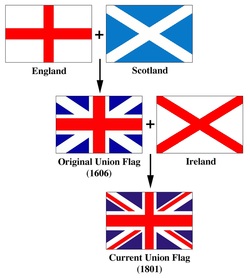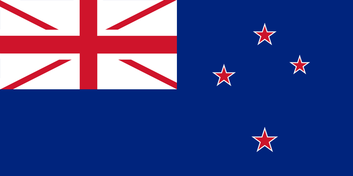|
14.01.2012 Scotland is making moves to become independent of the United Kingdom, and their independence could change the flag of the UK and other nations whose flags incorporate the Union Jack. If Scotland becomes fully independent of the UK, the Union Flag, or Union Jack, as it is commonly known, will become defunct, as the Union Jack incorporates the flags of England, Scotland, and Northern Ireland, but interestingly, not Wales, which is also a part of the UK. The Union Jack was created during the Union of the English and Scottish Crowns in 1606. Full Scottish independence would mean removal of the Cross of St Andrew from the Union Jack. This would have consequences for many nations, including Australia, New Zealand, the Cook Islands, Tuvalu, Niue, and the Republic of Fiji. These nations incorporate the Union Jack in the top left hand corner of their flags. If Scotland achieves full independence, these flags would need to change as a result, as would various state flags within Canada, Australia, and even the United States, as the State of Hawaii also has a Union Jack based flag. This may be the time for New Zealand to consider changing its flag, to something more relevant to our 21st century South Pacific nation, before events such as Scottish independence force change on us. Kyle Lockwood/silverfernflag.org  Evolution of the Union Flag From the Associated Press British Prime Minister David Cameron said Britain would allow Scotland to vote on the matter of independence but urged the country to make its intentions known “sooner rather than later.” Britain's government confirmed Tuesday it would happily offer Scotland the powers it needs to sever centuries-old ties to England. Prime Minister David Cameron's government said it would sweep away legal hurdles to allow the Scots a vote on whether their country should become independent for the first time since the 18th Century Act of Union, which united Scotland with England to create Great Britain. But in return, Cameron — who opposes any breakup of the United Kingdom, which also includes Wales and Northern Ireland — is urging Scotland to make its intentions clear "sooner rather than later." He claims investors are becoming increasingly wary of Scottish leader Alex Salmond's plans to delay a vote for several years, damaging Britain's economy. Salmond, head of Scotland's semiautonomous government, has long championed independence to allow the country greater control over lucrative oil and natural gas reserves in the North Sea. "This is a huge decision for Scotland. This is potentially the biggest decision we have made as a nation for 300 years," Salmond said Tuesday, while on a tour of an oil facility in Dyce, eastern Scotland. He insisted that Cameron should not take any role in setting out the timetable for the crucial referendum. "We are not going to be stampeded and dragooned by a Tory prime minister in London," Salmond said. Since Scotland voted in favour of a domestic legislative body in 1997, its parliament has had autonomy over education, health and justice and can make minor alterations to income tax. For now, London retains primacy on all matters relating to Britain as a whole — including defence, energy and foreign relations. There had been speculation the poll would be held in 2014, when nationalist sentiment could be at a high as the city of Glasgow hosts the Commonwealth Games and Scots mark the 700th anniversary of the battle of Bannockburn, a key military victory over England. Salmond's party has said that if it succeeds in winning independence, Scotland would —for now at least — keep Queen Elizabeth II as head of state and retain the British pound as its currency. Kirsty Wigglesworth/Associated Press
7 Comments
|
MEDIAArchives
December 2022
Categories
All
|


 RSS Feed
RSS Feed
